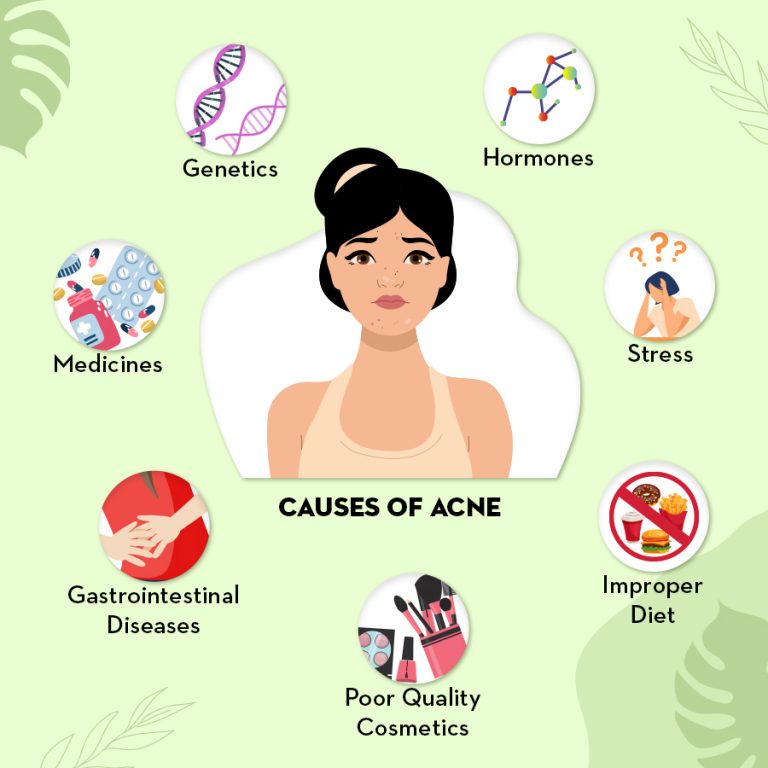Acne is a common skin condition that affects many people at different stages of life. While it’s often associated with teenage years due to hormonal changes, acne can persist into adulthood or even start later in life. Understanding the underlying cause of your acne is crucial for effective treatment and prevention. Here’s a step-by-step guide to help you pinpoint the cause and find the right solutions.
1. Evaluate Your Skincare Routine
Your daily skincare regimen plays a significant role in the health of your skin. Consider the following questions:
- Are you using harsh or comedogenic products? Harsh cleansers, heavy moisturizers, or makeup with pore-clogging ingredients can worsen acne.
- Is your routine consistent? Inconsistent application of skincare products or frequent changes can affect skin health.
Solution: Switch to non-comedogenic products and establish a consistent routine that includes a gentle cleanser, a suitable moisturizer, and sunscreen.
2. Examine Your Diet and Hydration
Dietary habits can influence acne. Look at your recent food choices and drinking habits:
- Do you consume a lot of sugar and processed foods? High sugar and refined carbohydrate intake can lead to acne flare-ups.
- Are you drinking enough water? Dehydration can cause skin dryness and exacerbate acne.
Solution: Adopt a balanced diet rich in fruits, vegetables, whole grains, and lean proteins. Aim to drink at least 8 glasses of water a day and limit sugary, fatty, and processed foods.
3. Assess Your Stress Levels
Stress can trigger or worsen acne through hormonal changes that increase oil production in the skin:
- Have you been experiencing high stress or anxiety recently? Stressful situations can lead to acne outbreaks or worsen existing acne.
Solution: Incorporate stress-management techniques such as exercise, meditation, or deep-breathing exercises into your daily routine.
4. Consider Hormonal Imbalances
Hormones play a significant role in acne development. Consider the following:
- Are you experiencing hormonal changes? Acne related to hormonal fluctuations often occurs in the form of breakouts on the chin or jawline.
Solution: Consult a healthcare provider for hormone level testing. Treatments might include hormonal therapies like birth control pills or medications like spironolactone.
5. Look at Your Medication and Supplements
Some medications and supplements can cause or worsen acne:
- Are you taking any new medications or supplements? Certain drugs, such as steroids, can lead to acne outbreaks.
Solution: Review your medications with your doctor to see if they might be contributing to your acne. They might suggest alternatives or adjustments.
6. Evaluate Your Sleep Patterns
Inadequate sleep can affect skin health:
- Are you getting enough restful sleep? Poor sleep can lead to increased stress levels and hormonal imbalances, which can trigger acne.
Solution: Aim for 7–9 hours of quality sleep each night and establish a regular sleep schedule.
7. Check for Underlying Medical Conditions
Certain medical conditions can manifest as acne:
- Do you have any chronic health issues or symptoms not related to acne? Conditions like polycystic ovary syndrome (PCOS) or thyroid imbalances can cause acne.
Solution: Consult a healthcare provider for a thorough examination and appropriate tests to rule out or manage underlying medical conditions.
8. Review Your Hygiene Practices
Sometimes, poor hygiene can contribute to acne:
- Do you frequently touch your face or use dirty items on your skin? Touching your face or using unclean items like phone screens can transfer bacteria and oils to your skin.
Solution: Maintain good hygiene by washing your hands regularly, cleaning your phone screen, and avoiding touching your face.
9. Track Your Acne Patterns
Keeping a detailed record can help identify triggers:
- When do your breakouts occur? Noting patterns related to your cycle, diet, stress levels, or product use can reveal triggers.
Solution: Keep an acne journal to track your diet, skincare products, stress levels, and any other factors that may affect your skin.
10. Seek Professional Help
If you’re unable to determine the cause of your acne on your own:
- Have you tried various home remedies without success? Persistent or severe acne may require professional evaluation.
Solution: Consult a dermatologist for a comprehensive skin evaluation and tailored treatment plan. They can offer advanced therapies and prescription medications if necessary.
Conclusion
Determining the underlying cause of acne requires a careful and thoughtful approach. By evaluating your skincare routine, diet, stress levels, and other factors, you can identify potential triggers and work towards effective treatments. If self-assessment doesn’t yield answers, a dermatologist can provide expert guidance and treatment options.





Comments